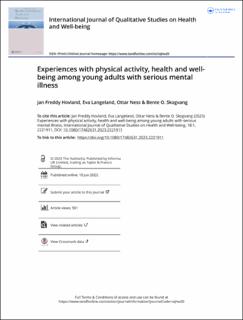Experiences with physical activity, health and well-being among young adults with serious mental illness
Peer reviewed, Journal article
Published version
Permanent lenke
https://hdl.handle.net/11250/3085635Utgivelsesdato
2023Metadata
Vis full innførselSamlinger
Originalversjon
10.1080/17482631.2023.2221911Sammendrag
Purpose To explore how young adults with serious mental illness (SMI) experience physical activity and how these experiences influence their perceived health and well-being. Methods Nine young adults with SMI who had participated in an aerobic high-intensity interval training program were interviewed in depth. The interviews were transcribed and subjected to reflexive thematic analysis. Results The results indicated that people with SMI mainly experience physical activity as a meaningful activity that contributes to an increased sense of well-being and better health. However, to overcome various barriers, it is crucial to experience social support and encouragement. The following three main themes were identified through reflexive thematic analysis: (1) positive changes in focus and an increase in well-being occur through physical activity; (2) increased mental strength results from physical activity; and (3) a lack of support and feelings of safety prevent physical activity. Conclusions This study shows that adapted physical activity is an important resistance resource that can promote stronger self-identity, increased mental well-being and social engagement and thus contribute to an improved ability to manage stressors. Furthermore, the findings reveal that to engage in physical activity and promote sustainable life changes, it is important for individuals to choose a physical activity based on personal interest and meaning.

